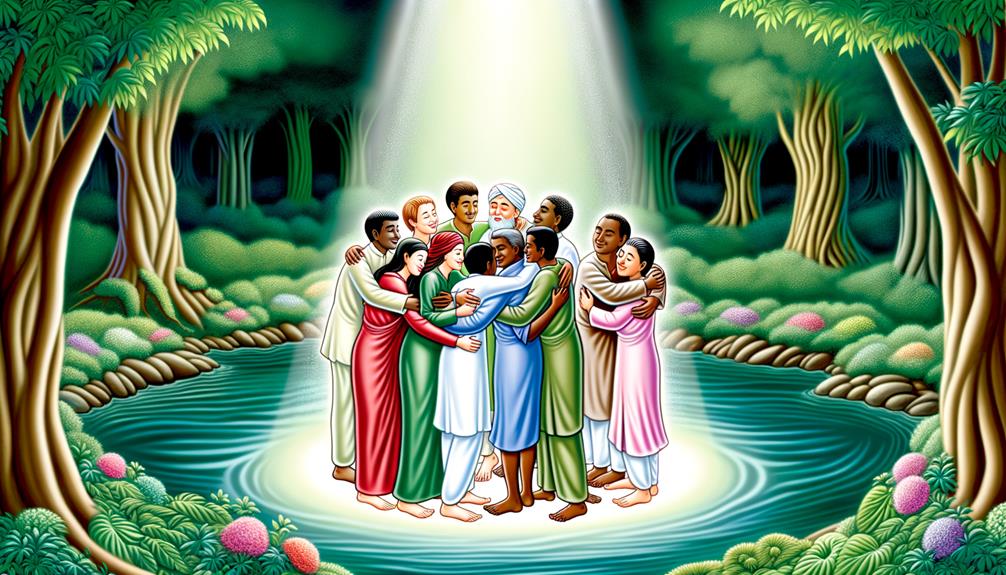Meaning of Unconditional Love in the Bible: Divine Grace
In the Bible, unconditional love is epitomized by the Greek term “agape,” representing a selfless, sacrificial, and enduring commitment. I see it reflected in God’s unwavering dedication to humanity, shown through the sacrificial act of Jesus and the everlasting covenant promises.
This love is further illustrated through parables like the Prodigal Son, emphasizing boundless forgiveness, and teachings by Apostle Paul, who describes love as patient and kind. Unconditional love in the Bible calls us to embody grace, mercy, and compassion in our daily lives.
To understand the depth and transformative power of this love, there’s much to explore.

Unconditional Love Meaning in the Bible: God’s Agape Love and Its Significance
| Aspect | Explanation |
|---|---|
| Definition | Unconditional love, often referred to as “agape love,” is selfless, sacrificial, and unwavering love that expects nothing in return. |
| Biblical Reference | John 3:16: “For God so loved the world that he gave his only Son, that whoever believes in him should not perish but have eternal life.” |
| God’s Example | God’s love for humanity, shown through Jesus Christ’s sacrifice for the forgiveness of sins. |
| Characteristics | Unchanging, forgiving, patient, merciful, and enduring despite human failures or imperfections. |
| Spiritual Significance | Demonstrates the essence of God’s character and serves as a model for believers in loving others. |
| Call to Action | Believers are encouraged to love one another with agape love (1 Corinthians 13:4-7). |
| Relevance in Life | Inspires Christians to show selfless and unconditional love in relationships, family, and community. |
Definition of Unconditional Love

Unconditional love, as depicted in the Bible, refers to a selfless, enduring, and sacrificial love that persists regardless of circumstances or the recipient’s actions.
When I think about this concept, I see it as the highest form of love, devoid of conditions or expectations.
Biblical texts often illustrate this love through acts of kindness, mercy, and forgiveness that transcend human limitations.
For those of us committed to serving others, such love becomes a guiding principle.
It challenges us to extend grace and compassion without expecting anything in return.
By embodying this love, we not only honor the Biblical teachings but also foster a community built on genuine care and unwavering support.
This definition encourages a profound commitment to altruistic practices.
God’s Love for Humanity

When examining God’s love for humanity, I observe that it manifests profoundly through the sacrificial act of Jesus, which underscores the ultimate expression of selfless love.
Additionally, the everlasting covenant promise illustrates God’s unwavering commitment to His people.
Moreover, His grace and mercy, extended abundantly, reveal a love that transcends human understanding and conditions.
Sacrificial Act of Jesus
One of the most profound demonstrations of God’s love for humanity is the sacrificial act of Jesus, who willingly gave His life to atone for our sins. This act transcends mere symbolism; it embodies the ultimate form of selflessness and divine love.
By understanding Jesus’ sacrifice, we grasp the depth of God’s unconditional love. Jesus’ death on the cross wasn’t just a historical event; it was a transformative act that offers redemption and reconciliation to all.
As individuals committed to serving others, this sacrificial love challenges us to act selflessly and compassionately in our daily lives. Reflecting on Jesus’ sacrifice, we find a model for our own actions, inspiring us to love and serve without conditions.
Everlasting Covenant Promise
Throughout biblical history, the concept of an everlasting covenant underscores God’s unwavering commitment and love for humanity. This covenant, detailed in both the Old and New Scriptures, reveals a divine promise that transcends time and circumstances.
- Abrahamic Covenant: God promises Abraham that his descendants will become a great nation, symbolizing a commitment to future generations.
- Mosaic Covenant: Through Moses, God provides the Law, establishing a framework for a righteous community dedicated to serving each other.
- New Covenant: In Jeremiah and fulfilled through Jesus, this covenant highlights God’s promise of redemption and internal transformation, ensuring a personal relationship with Him.
These covenants illustrate God’s unceasing love and dedication to guiding humanity towards a just and compassionate existence.
Grace and Mercy Abundant
Embracing His boundless grace and mercy, God demonstrates an unparalleled love for humanity that’s both transformative and redemptive.
In Scripture, grace and mercy aren’t mere abstract concepts but active divine attributes. Grace is God’s unmerited favor, freely given, enabling us to overcome sin. Mercy, on the other hand, embodies His compassion, sparing us from deserved judgment.
These qualities manifest through Christ’s sacrificial love, exemplified in Romans 5:8, ‘But God demonstrates his own love for us in this: While we were still sinners, Christ died for us.’
This profound love calls us to mirror it in our interactions, fostering a spirit of service and compassion. By embodying His grace and mercy, we reflect His unconditional love to the world.
Jesus’ Sacrificial Love

When I examine Jesus’ sacrificial love, I see it as the ultimate act of sacrifice that embodies unconditional love.
His willingness to suffer and die for humanity’s sins highlights the profound connection between sacrifice and redemption through love.
This act not only fulfills prophetic scriptures but also provides a foundational example of selfless love that transcends human understanding.
Ultimate Act of Sacrifice
In the narrative of the New Scriptures, Jesus’ crucifixion stands as the paramount demonstration of sacrificial love, embodying the essence of unconditional compassion. Analyzing this act provides profound insights into the nature of selfless service.
Firstly, Jesus willingly accepted suffering, highlighting a conscious choice to endure pain for others’ sake.
Secondly, his sacrifice transcended temporal bounds, offering a lasting impact on humanity’s spiritual journey.
Finally, the act epitomized ultimate humility, as Jesus, considered divine, chose to lower himself for humankind’s betterment.
These elements collectively illustrate a model of love that serves without expectation.
Redemption Through Love
As we examine the profound impact of Jesus’ sacrificial love, it becomes evident that his ultimate act of selflessness serves as the cornerstone for the concept of redemption in Christian theology. This act not only exemplifies the depth of his love for humanity but also challenges followers to embody a similar spirit of generosity and compassion. However, the path of living out such values can often lead to trials and tribulations, reinforcing the notion that “no good deed goes unpunished. ” Despite these challenges, believers are encouraged to find strength in faith, understanding that their sacrifices contribute to a greater narrative of grace and redemption.
Jesus’ willingness to lay down his life on the cross not only exemplifies unconditional love but also provides a path for humanity’s redemption.
This act underscores the transformative power of love, urging us to emulate such selflessness in our daily lives.
By understanding his sacrifice, we can grasp the depth of divine love and its capacity to redeem and renew.
This perspective encourages us to serve others, reflecting the same love that seeks to restore and uplift, thereby fulfilling the call to love unconditionally.
Parables of Love

The parables of Jesus serve as profound illustrations of unconditional love, revealing deep theological truths within relatable, everyday scenarios. Through these stories, Jesus conveys the essence of divine love, emphasizing its transformative power.
Three key parables stand out to me:
- The Prodigal Son: This parable highlights a father’s boundless love and forgiveness towards a wayward son, embodying God’s readiness to forgive repentant sinners.
- The Good Samaritan: Here, Jesus redefines neighborly love, urging us to show compassion and kindness, even to those we consider outsiders.
- The Lost Sheep: This story portrays God’s relentless pursuit of each individual, valuing every single person as immensely precious.
These parables challenge us to emulate such unconditional love in our daily lives.
Love in the Old Testament

Throughout the Old Scriptures, love manifests as a multifaceted covenantal relationship between God and His people, often characterized by steadfast loyalty and divine commitment. God’s love is not merely an emotion but a binding promise, evident in His covenants with figures like Abraham, Moses, and David. This divine love lays the foundation for social justice, mercy, and communal responsibility.
| Covenant | Recipient | Key Aspect |
|---|---|---|
| Abrahamic | Abraham | Promise of descendants |
| Mosaic | Moses | Law and moral guidance |
| Davidic | David | Eternal kingdom |
God’s unwavering commitment demonstrates that love requires action and fidelity, serving as a model for how we should treat one another. This covenantal love calls us to emulate God’s faithfulness in our communities.
Apostle Paul’s Teachings

How does Apostle Paul conceptualize unconditional love within the framework of Christian ethics and community life? In his letters, Paul emphasizes that love is the highest virtue, foundational to Christian living. He describes it as patient, kind, and enduring (1 Corinthians 13:4-7).
Paul’s teachings highlight that unconditional love is:
- Sacrificial: Just as Christ sacrificed for humanity, Paul encourages believers to prioritize others’ needs above their own (Ephesians 5:2).
- Unifying: Love fosters unity within the Christian community, breaking down divisions and promoting harmony (Colossians 3:14).
- Transformative: Through love, individuals and communities are transformed, reflecting Christ’s character and values (Romans 12:9-10).
Paul’s conceptualization urges us to embody these principles, fostering a community grounded in selfless, enduring love.
Love Commandments

Within the context of biblical teachings, love commandments serve as the ethical bedrock that guides believers in their relationships with God and others.
Jesus emphasizes two primary commandments: love God with all your heart, soul, and mind, and love your neighbor as yourself (Matthew 22:37-39).
These commandments encapsulate the essence of divine love, urging us to prioritize selflessness and empathy.
By loving God wholeheartedly, we align our lives with His will, while loving our neighbors fosters community and compassion.
This dual focus on divine and interpersonal love forms a thorough framework, encouraging us to act with integrity and kindness.
These love commandments therefore provide a profound, actionable guideline for anyone committed to serving others in accordance with biblical principles.
Living Out Unconditional Love

Building upon the foundational love commandments, living out unconditional love requires a practical and consistent demonstration of faith through our actions and attitudes.
To truly embody this divine love, I must integrate it into my daily life. This involves:
- Forgiving others: Emulating Christ’s forgiveness means offering grace even when it’s undeserved.
- Serving selflessly: Prioritizing others’ needs above my own, reflecting Jesus’ humility and service.
- Maintaining patience: Exercising patience in challenging situations, mirroring God’s long-suffering nature.
Conclusion
In exploring the essence of unconditional love in the Bible, I’ve discovered it’s deeply divine, demonstrated through God’s grace, Jesus’ sacrifice, and Paul’s poignant teachings.
These examples aren’t just historical hints but holy heralds, guiding us to live love actively, authentically, and altruistically.
The parables and commandments collectively call us to cultivate compassion, creating a community characterized by care.
Our challenge is clear: embody this boundless, biblical love in our everyday lives.






